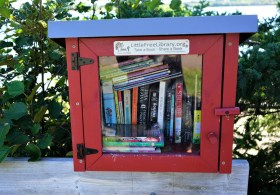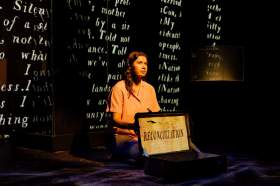So, I wanted to reach out to someone else here in NYC to have a dialogue with, this time focusing on new musical development.
Sammy Buck has had two shows at the New York Musical Theatre Festival in the last three years; this first was Like You Like It in 2004 (with composer Dan Acquisto), a teen-based adaptation of As You Like It set at a mall in the 1980s. Like a musical John Hughes film, it was a great success both at NYMF and the Cardiff International Musical Theatre Festival and won the National Music Theater Network‘s New Voices Prize.
The second was the book for Common Grounds, a unique dance-musical collaboration with five top choreographers for NYMF ’06, which earned runner-up for the Festival’s Most Promising New Musical prize.
Sammy is an alumnus of the USC filmic writing program and the Warner. Bros. comedy writing workshop and an Emmy Award-winning member of the 2005 TV Land Awards online writing team – but mostly, he a good, interesting guy who has been in the trenches writing musicals in NYC and has alot to offer folks beginning their career.
KRIS STEWART: So, Sammy, I want to have a chat back and forth about developing new musicals and the adventures herein. But first I want to give some background and context; which leads me to ask what was the journey that brought to a place of wanting to write musicals?
SAMMY BUCK: When I was a kid, I gravitated toward musicals. I remember seeing a program in my grandmother’s apartment of the musical version of Gone With the Wind, and when I was in elementary school, watching the movie for the first time on TV, I waited for a whole hour asking myself “Where are the songs?” Of course, they never came. I think I had a predilection for wanting to see a story told in song, though I don’t think I could form that exact explanation when I was younger.
When we first came to New York, I was eight years old. My mother said she knew she was in trouble when I stood at the corner of 42nd Street and 7th Ave. (in 1977, mind you), screaming “I LOVE THIS CITY!” She was somewhat mortified that her young son, that night in the front row of the mezzanine at the Shubert Theatre, howled with laughter every time an expletive was uttered by the characters in A Chorus Line.
In High School and college, I did a lot of writing assignments as songs. One Friday morning, after quite a late night working on the school paper, I wrote a song for Emma Bovary to the tune of “Somewhere that’s Green.” When I was a screenwriting major at USC, and the director of the program and I were not seeing eye-to-eye, I wrote a scathing “Waltz Between Sammy and Margaret” to the tune of the song from Evita.
True to my roots as the 8-year old on the corner in Times Square, I finally moved to New York and got into the BMI workshop. I had dabbled before with composers but was searching for a longtime collaborator. At the time, I had an idea for a musical about Santa Claus’s depression called North Polar Disorder. As time went on, I developed new ideas, one an adaptation of one of my favorite Hitchcock films. I worked with someone I met in my class at BMI. Not being able to get the rights to the movie, we decided to look for something in the public domain.
I recalled being a bit player in As You Like It in High School, and growing up in the ’80s and going to the mall, and came up with Like You Like It. That collaborator and I began work on the project, but he dropped out.
I was friends with two guys from the class behind mine at BMI, Jeff Marx and Bobby Lopez. They had a class member who they thought might be a good fit for me. So I met Dan Acquisto and we wrote Like You Like It together. It is odd to think I am following an eight-year-old Houston boy’s directive and dream, but I do think it is something for which I was always wired.
KS: I think it was the LA ASCAP workshop of Like You Like It that I first heard of your work. This is actually where I want to focus our chat – the development of LYLI and your other shows. Tell us about how writing LYLI at the BMI workshop influenced its development, and what got you to LA?
SB: Actually, you may be thinking of the NAMT (National Alliance for Musical Theatre) Showcase in 2002, which was in NY. We had previously presented the show at the ASCAP workshop in NY in the spring of 2002. We had two amazing panels moderated by Stephen Schwartz: Craig Carnelia and Carol Hall the first presentation, and Lynn Ahrens, Manhattan Theater Club‘s Lee Johnson and John McDaniel on the other. John McDaniel even mentioned the show and our names on Rosie O’Donnell’s show the next day.
KS: I certainly remember meeting you guys at the NAMT showcase, but my first exposure was reading coverage about you online on this crazy thing called the “Internet” – I thought it was about LA, but maybe it was ASCAP in NYC.
SB: We were writing the show from the ground up and we presented each new song to the room at BMI. Maury Yeston was very supportive, as were many of the council members and our peers, so we felt encouraged. We honed much of the first act at BMI, so when we presented at ASCAP, I could focus on some of the book issues.
We were next accepted into the Jonathan Larson Fellowship program at the Dramatists Guild, where we were mentored by David Shire and Richard Maltby, Jr., and guided by Lynn Ahrens and Stephen Flaherty, who ran the program with Arthur Kopit and Janet Neipris. We got to the heart of Act Two that year, and had an excellent opportunity (and frankly, a deadline) when John Simpkins at New York University took the show to his students to do a workshop production in ’03. He had heard about the show from ASCAP and BMI.
All of our recent and current opportunities spring from BMI and ASCAP – we did a “family tree” of sorts to trace how we have gotten where we are.
KS: Tell me more about how the BMI Lehman Engel workshop supported you guys.
SB: I will give you an example that typifies how the BMI workshop best works.
The first song Dan and I wrote for Like You Like It is called “Easy Way Out.” Our hero, Orlando, tells his new buddy Corey about why he has never been able to talk to the girl he likes. Dan nailed the ’80s idiom on his first try. My lyric was about how Orlando has chickened out from talking to Rosalind ever since his freshman year. The trick of the scene is that Corey is, unbeknownst to Orlando, really Rosalind, the very girl about whom Orlando is singing. Orlando laments how each time he had his chance, he took the Easy Way Out and never said hi, until he finally got the guts, went up to Rosalind, and SHE turned away. The button at the end of the song is “Corey” saying “SHE took the easy way out.” It was a sweet ballad. It was well-received at BMI.
Dan and I had just started working together and the success made us want to work together further. Now, here is where the input comes in. Maury Yeston recommended we make it a duet: Rosalind was there every time Orlando chickened out, so “Corey” could finish Orlando’s phrases for him, comment on what happened. Well, that comment opened up so many dramatic possibilities in this scene. And it made the song work on so many levels: “Corey” gains Orlando’s trust, Rosalind realizes she has a chance with Orlando, Orlando and Rosalind bond in a theatrical sense. It has become one of the most effective scenes in the show. All thanks to our input at BMI.
As for LA, we did end up there in ‘04. We had a two-week workshop-ish reading to iron out some changes we made in the show — a try-out, if you will, for our subsequent NYMF production. We have made quite a few changes since NYMF, which we played out in a reading with actual high school students a year or so ago. In one of the changes, we added a song. The second song in the show, it got a bigger hand than our tried-and-true opening number. Yet, in our guts, there is something off. Before our next incarnation of the show (we are in talks abut something this summer), we will present the song at BMI. We have been presenting from a few other projects in the last three years, so we have not presented a new Like You Like It song in a while. It should be interesting to see how it is received.
KS: Alright – one last question. Actually, two. A lot of folks who read this column are from outside NYC – what are the things that are unique to this city that is beneficial to writing a musical, and what can someone do if they’re outside NYC to develop their show? And which of the processes you’ve been through have been most beneficial to you?
SB: First off, there are so many writers here doing what we’re doing. While it can be competitive, it is indeed a community – and a resource pool for actors, directors, producers and designers whom some of us know and whom we can connect with out writer friends for their presentations and productions. Obviously, New York and LA, as well as Chicago, are huge entertainment industry towns, so the benefits there are access and exposure to the people who can help shepherd a show.
For someone out of town, I would say to turn to your community. Not just those in the arts, but your family and friends. Someone always knows someone who knows someone. And that networking can lead to an opportunity at a local theatre – from community theatre to the high-end professional theatres in town.
The Dramatists Guild is an excellent resource for writers – they publish a resource directory listing the theatres and competitions around the country. Also, in the age of email and PDFs and Finale music files, collaboration doesn’t always have to happen in the same room.
The most beneficial thing I ever did, without a doubt, is joining the BMI Workshop.
Bottom line: writing musical theatre can be one hell of a path. You need the training and the support network, which BMI has always provided. And I would think that wherever you live, if you can find a place to hone your craft and commiserate/network/befriend other artists, the path becomes easier.
Visit Sammy on the web at: www.sammybuck.com




